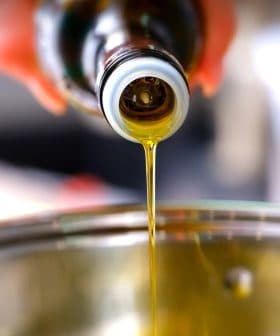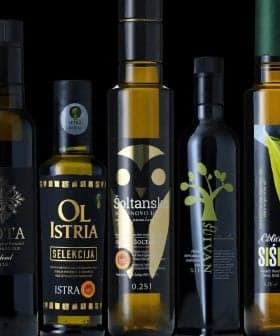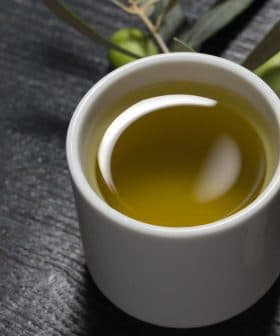Gelato With Extra Virgin Olive Oil Is a Functional Food, Italian Researchers Say

 Feb. 3, 2020 09:25 UTC
Feb. 3, 2020 09:25 UTCResearchers have found that extra virgin olive oil can be added to gelato as a functional ingredient, improving its health benefits without altering the taste. This innovative extra virgin olive oil gelato has been classified as a “functional food” due to its improved health benefits, including increased antioxidant activity and polyphenol content.
The latest findings in the development of novel foods with improved nutritional profiles will delight gelato lovers.
According to studies conducted by Raffaele Sacchi, a professor of agri-food industries and the Mediterranean diet at the University of Naples Federico II, extra virgin olive oil can be added to the Italian-style artisanal ice cream as a functional ingredient, improving its health benefits without affecting the taste.
Extra virgin olive oil can be used as a fat replacement in gelato, since it does not significantly change the original flavor, lowering the ratio between saturated and unsaturated fats, improving the amount of polyphenols, and increasing the antioxidant activity.
“We aimed to characterize an innovative gelato and, with the support of a gelato maker from Caserta, we made this type of ice cream adding an extra virgin olive oil produced in Battipaglia, characterized by medium bio-phenol content and a green-herbaceous flavor with a moderately bitter taste,” Sacchi told Olive Oil Times.
“Basically, we used the extra virgin olive oil as an ingredient added to the basic scheme of production and we formulated the gelatos in order to compare the chemical-physical and sensory profiles, and therefore looking into what happened at the level of aromas, antioxidants and so on,” he added.
See Also:Cooking with Olive OilThe analysis confirmed an interesting fact that had been previously hypothesized: the interaction of the extra virgin olive oil polyphenols with the milk protein matrix.
“This means that if you add a very bitter and fruity olive oil to the gelato, the intensity is dampened by the bonds that are formed with proteins, and for example in a fior di latte ice cream, you don’t perceive the bitterness and pungency, but pleasant floral, herbaceous notes,” Sacchi said.
The total phenolic content, volatile compounds and the results of the sensory analysis indicated that this innovative extra virgin olive oil gelato can be regarded as a “functional food,” due to the improved health benefits.
Moreover, the interaction between the ice cream matrix and the extra virgin olive oil components may be a solution to enhance consumers’ acceptability of the bitterness inherent to the oil by reducing the sensation in the mixture. It could also impact the extractability of phenolic compounds.
“The problem is that, even if today we well know the beneficial effects of extra virgin olive oil’s bitter compounds on our health, not all consumers accept bitterness,” Sacchi said. “Then, the ‘masking effect’ can be a novel strategy for creating a functional ‘Mediterranean ice cream’ that maintains sensory and nutritional quality characteristics.”
“In fact, with the insertion of eight to 10 percent of extra virgin olive oil in the ice cream, we supply a fair amount of polyphenols,” he added. “Moreover, the industry could look for other strategies of adding olive derivative phenolic compounds, including those from the olive leaves and mill wastewaters.”
The findings of this study also led the researchers to carry out a second experiment.
“The investigation focused on the full replacement of milk with extra virgin olive oil, keeping constant the amount of total fat, with the aim to better understand the mechanisms involved in the interaction between milk proteins and olive oil biophenols, and the bioavailability of the latter,” Sacchi said.
During the experiment, which was the subject of a degree thesis in food science and technology, the researchers made two types of gelato: one vanilla and the other with chocolate. Additionally, each flavor was formulated in two variants, one with milk cream and the other with extra virgin olive oil.
Considering the various factors such as humidity, the four gelatos were made so that they all had the same amount of fats, proteins and other elements.
Using the oil as a lipidic component of the ice cream, then changing the profile of fatty acids while adding antioxidants and flavors, the aim was to assess sensory quality variations and find out if the polyphenols could still be absorbed and bio-available.
Sensory and chemical analyses were carried out and then the samples were subjected to an in vitro standard system that simulates digestion.
“We verified that the antioxidant molecules present in the olive oil are released from ice cream under the conditions of digestion and become bioavailable,” Sacchi said. “Compared to the chocolate polyphenols, the antioxidants of the extra virgin olive oil were found to be even more available, being smaller and more easily released and potentially absorbed.”
Furthermore, the panel did not distinguish the chocolate gelato made with the oil from the one with milk, appreciated both and perceived only a slight difference in viscosity.
Meanwhile, in vanilla ice cream, the difference was statistically perceived but, the olive oil ice cream was considered “very acceptable” in terms of taste, aroma, and viscosity.
“We are therefore writing a second article, that will soon be published, on the functionalization of this gelato,” Sacchi said. “This work shows that extra virgin olive oil can be used as a fat replacement in gelato, since it does not significantly change the original flavor, lowering the ratio between saturated and unsaturated fats, improving the amount of polyphenols, and increasing the antioxidant activity.”


 Ylenia Granitto
Ylenia Granitto






